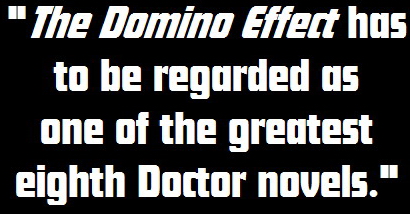|
| |
|
STORY PLACEMENT THIS STORY TAKES PLACE BETWEEN THE NOVELS "THE INFINITY RACE" AND "RECKLESS ENGINEERING."
WRITTEN BY DAVID BISHOP
RECOMMENDED PURCHASE OFFICIAL BBC 'EIGHTH DOCTOR' PAPERBACK (ISBN 0-563-53869-4) RELEASED IN FEBRUARY 2003.
BLURB The TARDIS lands in the Scottish capital, Edinburgh, during Easter 2003. The city is at a standstill, its public services close to collapse and its people terrorised by
a bombing campaign. the Doctor's friends is caught in a deadly explosion, while THE other appears on TV confessing to murder. The TARDIS is stolen by forces intent on learning its secrets. AND When the Doctor tries to investigate, HE SUFFERS crippling
chest pains.
suppress humanity's development - but how and why? Who is the prisoner being held in the Tower of London? Could he or she hold the key to
saving
mankind? must choose between saving his friends or saving Earth in the past, present and future. But the closer he gets to the truth, the worse his CHEST PAINS become... |
|
|
The Domino Effect FEBRUARY 2003
It’s tempting to be scathing of BBC Books’ “alternative timelines” arc, given that Virgin had done something very similar almost a decade previously in the New Adventures, but I just can’t bring myself to be because it’s so very impressive. The canon may be littered with innumerable tales that explore parallel worlds and their pitfalls, but even to this day you will struggle to point to one that deals with the old chestnut with the grace and refinement that David Bishop’s Domino Effect does.
With a novel such as this, it’s important to recognise that its principal appeal doesn’t lie with its star-crossed supporting characters, or even the warped would-be world that they inhabit. Its appeal lies with our regular characters, and the trials and horrors that this new, corrupted timeline subjects them to. Anji is something of a case in point, as Bishop deftly juxtaposes her burning desire to return home with a world that is so near yet so far from it. Having found herself in a technologically and sociologically backward 2003, Anji wanders through the first half of this book in an incredulous daze, enduring the most appalling racist treatment just so that she can hang on to the hope that she’s come home at last. Then, as realisation begins to dawn, her perplexity turns to anger, prompting some of the most penetrating scenes that she’d ever share with the Doctor.
Fitz is even better served, in many ways. Labelled as a terrorist; tried, tricked and tortured, this book marks one of Fitz’s darkest hours. I love how Bishop captures the man’s nobility, whilst at the same time laying his human weaknesses bare in the most simple of ways. One scene in particular really lingers in which Fitz, despite having to face an execution squad in the morning, just wants to get his head down for some kip. He’s so fatigued in every sense that death doesn’t even hold that much fear for him anymore; he just wants to get a decent night’s sleep so that he can get his fear back.
Fitz’s thread of the story is also a remarkable one as it allows Bishop to pass comment on the gradual post-September 11th revocation of basic human rights, putting a character that his readers care about in the regrettable position of being wrongly accused and detained, and precluded from even putting forward his own case. It’s provocative stuff.
Most cleverly of all though, Fitz’s story leads us right to heart of the mystery surrounding this replacement reality. In the cell beside him is none other than a nonagenarian Alan Turing, his breakthroughs struck from history in order to alter its course. The Domino Effect thus serves as a touching coda to The Turing Test, as the author portrays the tortured character with the same dignity that Paul Leonard did, but this time in a setting that better reflects his import. I love the implication that it wasn’t just the suppression of Turing’s work that gave rise to this timeline, but the condemnation of his homosexuality too. The removal of all computers from history doesn’t account for this reality’s rampant bigotry; at least not wholly so.
for guessing who’s responsible for ruining poor Turing’s life and subverting the course of history, but even here Bishop manages to astound by presenting us all with a Sabbath who’s not the man we know, but a native of this reality. Just like his counte- rpart in our world, this Sabbath has proclaimed himself Time’s Champion, and has altered the course of Earth’s history with the intention of saving it from the cataclysm to come. The irony is that, in doing so, he’s actively undermining the efforts of ‘our’ Sabbath, and bringing the manifold multiverse to within a whisker of complete catastrophe.
Bishop also does a magnificent job of the driving the arc forward here, not only in how he progresses matters narratively, but also in how he sheds some light upon what has already happened. With Terrance Dicks-like plainness, The Domino Effect details how the loss of the Time Lords has destabilised the Time Vortex to the point where it is now on the brink of total collapse, and when it does all the competing versions of history will collide, and forces from beyond creation will feast upon the ensuing chaos.
If I had one criticism to level at this novel, it would be that the Doctor is portrayed as a bit of passenger. Rather than act as a catalyst for events, here he is simply swept up in them. He does enjoy a few moments of poignant reflection – his ruminations about crossing his own timeline to unravel the mystery of his past, for instance, or his internal debate as to whether he has the right to simply try and erase the lives of the inhabitants of this universe – yet the focus of that reflection remains, for the most part, abstract.
On the whole though, The Domino Effect has to be regarded as one of
the greatest eighth Doctor novels. Whilst it’s clearly a book that’s best enjoyed as
part of its sprawling story arc, it’s
still perfectly capable of being enjoyed in isolation - provided that
you’re able to stomach a tormenting finale, that is - and as such it’s
one that I’d
recommend to anybody.
|
|
|
Copyright © E.G. Wolverson 2010
E.G. Wolverson has asserted his right under the Copyright, Designs and Patents Act, 1988 to be identified as the author of this work. |
|
|
Unless otherwise stated, all images on this site are copyrighted to the BBC and are used solely for promotional purposes. ‘Doctor Who’ is copyright © by the BBC. No copyright infringement is intended. |
|

.jpg)
.jpg)

 Of course, there
are no prizes
Of course, there
are no prizes